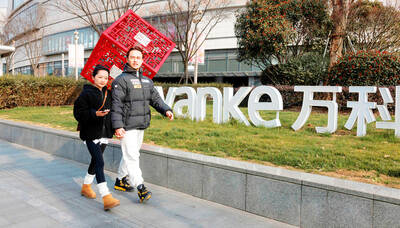The remote Pacific island state of Nauru was searching for a new airlink yesterday after being cut off from the rest of the world by an American bank's seizure of its only aircraft.
"We're looking for replacement capacity, which could come in the form of a new aircraft, or it could come in the form of other airlines assisting us," Air Nauru chief executive Geoff Bowmaker said from his Melbourne base.
"I'm hopeful that by early tomorrow morning we'll be able to resume some flights," Bowmaker said.
The island -- midway between Guam and Fiji -- was so remote that travel by boat to the nearest country with an airline was not feasible, he said.
Air Nauru's sole plane, a Boeing 737-400, was seized by the Export-Import Bank of the United States in Melbourne on Sunday after an Australian court gave the go ahead.
The tiny island, whose people were once among the richest per capita in the world, had failed to make payments on the aircraft since 2002, the bank said.
The bank is the official export credit agency of the US.
The airline had also provided services to the Solomon Islands, the Marshall Islands, Fiji and Australia.
Solomon Islands Prime Minister Sir Allan Kemakeza was among the passengers whose travel plans had been disrupted by the seizure of the aircraft, Australia's national radio network reported.
He had been scheduled to visit Taiwan.
The 7,500 residents of Nauru, a 21km2 coral atoll, were once among the world's wealthiest due to the export of phosphates, mostly from bird droppings.
But the reserves are almost exhausted and with earlier wealth squandered through corruption and mismanagement, the country is virtually bankrupt.
Nauru claimed in court that the US had promised support for aircraft financing in return for its help in gathering foreign intelligence, Australia's AAP news agency reported.
The Washington-based bank said in a statement that it "appreciates the difficulties that the court's decision presents to Air Nauru and the Government of Nauru."
"However, this action follows numerous unsuccessful attempts to negotiate a resolution and is now unavoidable in order to protect the interests of US taxpayers," the bank said.

CHIP RACE: Three years of overbroad export controls drove foreign competitors to pursue their own AI chips, and ‘cost US taxpayers billions of dollars,’ Nvidia said China has figured out the US strategy for allowing it to buy Nvidia Corp’s H200s and is rejecting the artificial intelligence (AI) chip in favor of domestically developed semiconductors, White House AI adviser David Sacks said, citing news reports. US President Donald Trump on Monday said that he would allow shipments of Nvidia’s H200 chips to China, part of an administration effort backed by Sacks to challenge Chinese tech champions such as Huawei Technologies Co (華為) by bringing US competition to their home market. On Friday, Sacks signaled that he was uncertain about whether that approach would work. “They’re rejecting our chips,” Sacks

Taiwan’s long-term economic competitiveness will hinge not only on national champions like Taiwan Semiconductor Manufacturing Co. (TSMC, 台積電) but also on the widespread adoption of artificial intelligence (AI) and other emerging technologies, a US-based scholar has said. At a lecture in Taipei on Tuesday, Jeffrey Ding, assistant professor of political science at the George Washington University and author of "Technology and the Rise of Great Powers," argued that historical experience shows that general-purpose technologies (GPTs) — such as electricity, computers and now AI — shape long-term economic advantages through their diffusion across the broader economy. "What really matters is not who pioneers

BUBBLE? Only a handful of companies are seeing rapid revenue growth and higher valuations, and it is not enough to call the AI trend a transformation, an analyst said Artificial intelligence (AI) is entering a more challenging phase next year as companies move beyond experimentation and begin demanding clear financial returns from a technology that has delivered big gains to only a small group of early adopters, PricewaterhouseCoopers (PwC) Taiwan said yesterday. Most organizations have been able to justify AI investments through cost recovery or modest efficiency gains, but few have achieved meaningful revenue growth or long-term competitive advantage, the consultancy said in its 2026 AI Business Predictions report. This growing performance gap is forcing executives to reconsider how AI is deployed across their organizations, it said. “Many companies

China Vanke Co (萬科), China’s last major developer to have so far avoided default amid an unprecedented property crisis, has been left with little time to keep debt failure at bay after creditors spurned its proposal to push back a looming bond payment. Once China’s biggest homebuilder by sales, Vanke failed to obtain sufficient support for its plan to delay paying the 2 billion yuan (US$283.51 million) note due today, a filing to the National Association of Financial Market Institutional Investors showed late on Saturday. The proposal, along with two others on the ballot, would have allowed a one-year extension. All three